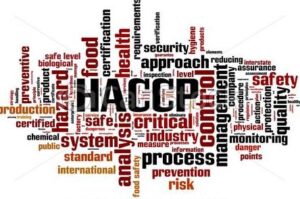 TAP Series® HACCP Managers Certificate Course – Hazard Analysis and Critical Control Points or HACCP (/ˈhæsʌp/) is a systematic preventive approach to food safety from biological, chemical, and physical hazards in production processes that can cause the finished product to be unsafe, and designs measurements to reduce these risks to a safe level. In this manner, HACCP is referred to as the prevention of hazards rather than finished product inspection. The HACCP system can be used at all stages of a food chain, from food production and preparation processes including packaging, distribution, etc. The Food and Drug Administration (FDA) and the United States Department of Agriculture (USDA) say that their mandatory HACCP programs for juice and meat are an effective approach to food safety and protecting public health. Meat HACCP systems are regulated by the USDA, while seafood and juice are regulated by the FDA. The use of HACCP is currently voluntary in other food industries.
TAP Series® HACCP Managers Certificate Course – Hazard Analysis and Critical Control Points or HACCP (/ˈhæsʌp/) is a systematic preventive approach to food safety from biological, chemical, and physical hazards in production processes that can cause the finished product to be unsafe, and designs measurements to reduce these risks to a safe level. In this manner, HACCP is referred to as the prevention of hazards rather than finished product inspection. The HACCP system can be used at all stages of a food chain, from food production and preparation processes including packaging, distribution, etc. The Food and Drug Administration (FDA) and the United States Department of Agriculture (USDA) say that their mandatory HACCP programs for juice and meat are an effective approach to food safety and protecting public health. Meat HACCP systems are regulated by the USDA, while seafood and juice are regulated by the FDA. The use of HACCP is currently voluntary in other food industries.
TAP Series® HACCP Managers Certificate Course
Developed in conjunction with NSF International, TAP Series is proud to provide this exclusive online HACCP Managers Certificate Course.
This course meets both nationally and internationally accepted HACCP standards. It contains the information needed to effectively participate in the organization, development, implementation, and management of a successful HACCP plan. The student will experience practical, real-world interactive case studies that cover the “five preliminary steps” of a HACCP plan and the application of its “seven principles”. Also included are HACCP plan development forms that can be printed and used to create a HACCP program.
The course provides the foundational knowledge needed to comply with the Richard B. Russell National School Lunch Act. Successful completion of this course provides a certificate recognized by the American Culinary Federation for 15 hours of continuing education credits.
This course is a must for food industry education, food manufacturers, health care facilities, food service operations, retail food purveyors and any organization or business that handles or transports food products.
